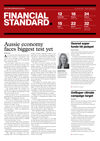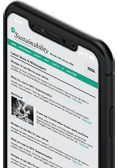Editor's Choice
Podcast: Recruitment and salary outlook 2025
In this episode of The Greener Way, Kaizen Recruitment's Simon Gvalda talks to Financial Standard managing editor Jamie Williamson about the current state of the job market for ESG professionals and offers tips around negotiating salaries and benefits.
Clean energy transition a top priority for productivity: PC
The Productivity Commission has identified 15 priority reforms areas to boost productivity, with a focus on investing in cheaper, cleaner energy.
Green moves: Chief Executive Women, Hearts & Minds, Rabobank
The Hearts & Minds chief executive will depart after less than a year in the role, while Rabobank brings on a sustainability lead and the ACSI head joins the Chief Executive Women board.
Australians reject net zero targets, polling claims
New polling suggests Australians are still not convinced a move to net zero is in their best interests, much preferring the government focus on affordability and reliability.



















Imposing a levy on imports that maintains CO@ emissions at local levels MUST include the emissions generated from inbound freight. Then we will some non-sensical product imports.
I imagine it would then kill off the proposal to import potatoes from Canada, for example.
As an employee in the manufacturing sector, I sense that industry is concerned at the downstream cost increases for energy consumption from a tax imposed on producers for CO2 emissions. Our operations in NSW incurred a 30% hike in electricity costs last year.
if a $20 a tonne levy is ever passed through to businesses buying electricity, it will push the cost up another 20%. In marginalising domestic manufacturing, has anyone considered balancing this domestic impost with penalties on energy intensive competitor imports?
Could we not impose an even playing field where importers are required to maintain CO2 emissions at the local level, without going into the territory of protectionism?
I think a lot of the anger being displayed throughout the national electorate is because the impost of a tax implies ONLY that business and consumers will use less fuel & electricity when the cost jumps a further 25%. Where are the pro-active policies for renewables, imports and alternates to balance this community cost?
I understand that electricity userd in NSW will be hit with 42% rises in charges over the next few years due to current infrastructure plans, on top of last year's 30% rise. Now we forsee government layering another 25% based on carbon dioxide emissions.
So the power cost doubles over 3-4 years.
How many businesses in NSW will consequently disappear?
Where is the capacity in substitutes?
Why isn't Paul Howes making a big noise about this?